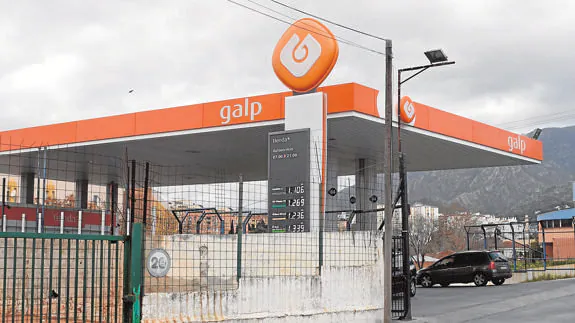Fuel prices in Marbella can be up to 12 cents a litre more expensive than elsewhere in the province
The control of most petrol stations by major oil companies and a lack of competition means that prices may be higher than the average
Mónica Pérez
Viernes, 10 de febrero 2017, 15:31
Drivers who regularly travel around Malaga province are probably more aware than most of a fact which has just been confirmed by official statistics: fuel prices in Marbella are higher than elsewhere in the region, and this has become even more noticeable with the latest increases. A study carried out for SUR shows that filling up with petrol (the fuel which is most used) in Marbella is more expensive than in Malaga city or elsewhere along the coast. According to the official figures, the average price for diesel is 1.163 euros per litre in Marbella, 1.147 in Malaga and 1.146 in Seville.
It is interesting to note that in cities where people have more spending power, the fuel prices tend to be lower. Granada is one of the cheapest places in Andalucía to buy fuel, at a cost of 1.124 euros a litre; this is reflected elsewhere in Spain, too, such as Bilbao (1.126) and Zaragoza (1.127).
Prices will continue to rise this year
-
Drivers in Malaga are now paying about 15 cents more per litre than they did a year ago, when diesel was about one euro. The blame lies with the increase in the price of a barrel of Brent, after the Organisation of Petrol Exporting Countries (OPEC) agreed to reduce production on 30 November. It now costs 56 dollars and experts warn that it could reach 60 during 2017. If so, it means that the price of fuel will continue to rise.
Perhaps the most important point is that when comparing fuel prices in Marbella and the rest of the province or Malaga city, the difference can be as much as 12 cents a litre. In a tank which takes 50 litres it could mean a saving of six euros, depending on the petrol station.
In neighbouring municipalities such as Estepona the average price of diesel is 1.138 euros, and in Mijas, the other side of Marbella, it is 1.141. This is due to the existence of a large number of 'independent' petrol stations, which do not sell a particular brand of fuel, compared with those which exclusively sell one major brand. Recently, it has become possible to find some of the 'low-cost' petrol stations on industrial estates.
In the case of Malaga province, the entry of Oil Distribution Terminals (ODT) has also played a part. Last year, the ODT moved 103,163 tons of diesel through Malaga port for use by independent suppliers. This means "prices can be contained," says the president of the Port Authority, Paulino Plata.
Discounts and personnel
We have consulted major figures in the sector and representatives of consumers associations about these figures. Luis Calero, the vice-president of the Provincial Association of Service Stations, says that in Malaga city there are fewer independent and unattended petrol stations as in other places, where competition is greater. "There is a structure of big petrol companies, like Repsol and BP, who keep prices stable on the market," he explains. The same applies in Marbella.
Luis Calero admits that there can be a price difference of up to 12 cents between some filling stations and others, but points out that this does not take into account the discounts offered by each company (usually between four and five cents per litre) in collaboration with organisations such as El Corte Inglés and Carrefour. "The difference is not as great as it seems. Consumers should not just look at the price, but consider the collaboration agreements and the fact that the petrol stations are staffed. It's not all about the price," he says.
Lola García, president of Facua Malaga, says it is possible that there is an agreement over prices between petrol stations in the town, something which would be illegal. "We are watching the situation. The Market Competition Commission issues fines every day for cartels and monopolies," she says.
